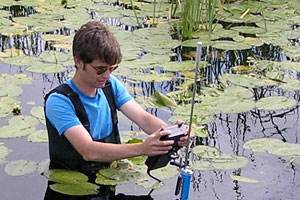 Agriculture Could Increase the Release of Carbon Dioxide from RiversFOR IMMEDIATE RELEASE Trent Researchers Publish New Findings in Prestigious Scientific Journal Monday, December 22, 2008, Peterborough “Our work is a first step in identifying how organic matter is processed in agricultural streams,” explained Mr. Wilson, who is pursuing his Ph.D. through Trent’s Environmental and Life Sciences Graduate program. “Hopefully it can help to inform land use decisions pertaining to the health of downstream aquatic systems and can inform future research geared at improving our ability to make these decisions.” Together with his supervisor Professor Xenopoulos, Mr. Wilson examined the quality of dissolved organic matter in 34 rivers in Ontario along a gradient of minimal-to-intensive agriculture. They found that higher levels of cropland cultivation and usage resulted in a decrease in the structural complexity of the dissolved organic matter in the rivers. The loss of nearby wetlands also contributes to a decrease in the structural of the organic matter in rivers. They suggest that this simplification of organic matter could lead to elevated rates of microbial carbon processing. As a result organic matter may be more readily removed from rivers either through storage in sediments or through release into the atmosphere as carbon dioxide. “Land use decisions can strongly impact how stream ecosystems function and how energy moves through them. Farmers who choose to undertake more environmentally friendly land use practices are providing society with a beneficial service,” explained Mr. Wilson. “Where wetlands have been maintained as a component of the landscape and where perennial crops, like forages or pasture have been incorporated into rotation, we see much less drastic changes to how stream ecosystems function.” Mr. Wilson noted that this study in particular highlights the importance of carefully managing agricultural inputs of nitrogen fertilizer. Nature Geoscience is a monthly multi-disciplinary journal aimed at bringing together top quality research across the entire spectrum of the Earth Sciences along with relevant work in related areas. ”I’m very happy that this paper is going to be published in such a respected journal because it allows the research to be communicated to a very broad and interdisciplinary group of readers.” -30- For further information, please contact Dr. Maggie Xenopoulos at (705) 748-1011, ext. 7699 or Henry Wilson at (705) 748-1011, ext. 7633. |

































 In a new study published online yesterday in the prestigious
journal Nature Geoscience, Trent University researchers Henry
Wilson and Dr. Maggie Xenopoulos found that intensive
agriculture decreases the chemical complexity of dissolved
organic matter in nearby rivers, which could affect the release of
carbon dioxide from river systems.
In a new study published online yesterday in the prestigious
journal Nature Geoscience, Trent University researchers Henry
Wilson and Dr. Maggie Xenopoulos found that intensive
agriculture decreases the chemical complexity of dissolved
organic matter in nearby rivers, which could affect the release of
carbon dioxide from river systems.